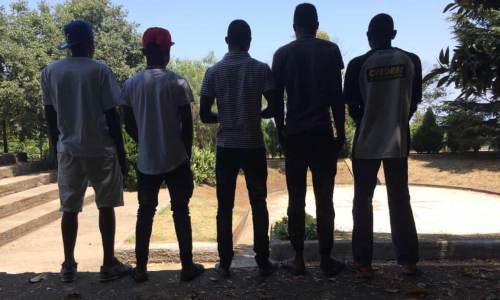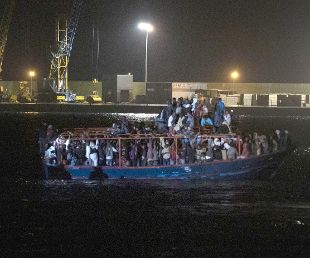Market Commodities: Unaccompanied Minors Fleeing Without Any Protection
“I got out of Italy. Now I’m in a safe country.” ‘A’s message arrives early in the morning, a young Eritrean man who we met at Pozzallo and then followed throughout his first month at a centre for minors in the province of Syracuse. From the moment he arrived, ‘A’ had continued to repeat the first sentence he heard in Italian: “You are in Italy, a safe country.”
These few little words continued to revolve in his mind, especially when he finally managed to decode them. ‘A’ is 15 years old and speaks only a little English, but in his own country he managed to find a way to study. Until, inexorably, the moment came to run away from a life of compulsory conscription. His flight from armies and violence then turned into months of new deprivation and abuse, meted out again by men with guns and without scruples. “Every step has its price”, “when you are a fleeing refugee, you are simply a commodity. It isn’t up to you, but up to the market to determine your value, and you have to get used to it.” These are the words he used to tell us about his journey.
Fortunately ‘A’ managed to arrive in Europe, “by chance”, because if he had left a few months later he would have ended on the bottom of the sea like so many of his travelling companions. In July he was transferred to a centre for minors, having spent 3 weeks in the Hotspot, and we saw him again together with other residents of the centre in the public square of the small town in which they were placed; a dozen young guys who then began to describe what they were living through in those months. What hit us from this beginning of their accounts were not so much the comments or complaints regarding technical or structural problems in the centre (more or less absent), but an almost total climate of tension and mistrust in the workers: “You can’t communicate in this place. If you ask for an explanation, you get vague replies and if you keep asking, the threats arrive. They say that we’ll have to leave the centre, that we won’t get papers, or that they’ll call the police.” “We have to keep secrets in our community, otherwise they threaten us. If you see something that isn’t right, you have to hide it.”
‘A’ and the young men who live with him are thus so scared by being punished that they asked us to withhold any information about where they live. “The manager tells us that he writes reports on us, and if it doesn’t go well, we’ll end up on the street.” Gradually we find out that there are various workers in the hostel, including a linguistic mediator, and constant interference of the manager’s family in the day to day running of the centre. One young man shows us that he has a tooth almost completely taken over by a cavity, hidden by a visible abscess, saying that he has struggled with the pain for weeks, only partly subdued by medicines: after a month he’s still in the same situation. Another lists off countless cases in which the police were called to deal with conflicts over food, lack of clothes, the impossibility of having pocket money – which is distributed in a different way to different residents – and the misunderstandings which derive from bad translation. “One time a policeman told me that he would send me back to Gambia if I didn’t stop complaining”, says one boy. “I don’t feel at all safe here.”
We flag up the situation at those who ought hear about it, and present ourselves to the manager of the centre, with whom we are still waiting to have a more significant meeting. We talk about the clear issues, and emphasise the importance of an educational approach in a community for minors, where the appeal to police as conflict mediation cannot be standard practice. The discussion is soon moved on to the events organised for the residents, the sporting activities, the legal support and the naming of tutors, which we know is unfortunately a wide-spread problem, due to bureaucratic and organisational delays and the long time taken by the court for minors in Catania. The managers assure us that they act in the utmost respect for the young men, who obviously “ought be thankful”, and in the meantime minors continue to leave the centre, trying get back to the places they left.
“I tried three times to return to Catania” says C., but they always brought me back here. “There are some people among us who have even thought about going back to the port of Augusta or the Hotspot. If we have a place there, because no one can stay here.” We follow the guys for months: the police interventions continue, and those who have not resigned to being ignored in the name of maintaining the peace continue to flee, those who see no sense in it. Some have begin to go to Italian school, others have left it, despite having waited months, so that they – like ‘A’, on their own, can go in search of a better place.
Lucia Borghi
Borderline Sicilia
Project “OpenEurope” – Oxfam Italia, Diaconia Valdese, Borderline Sicilia Onlus
Translation by Richard Braude


